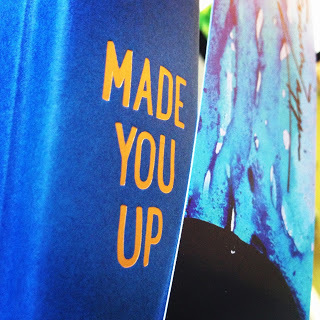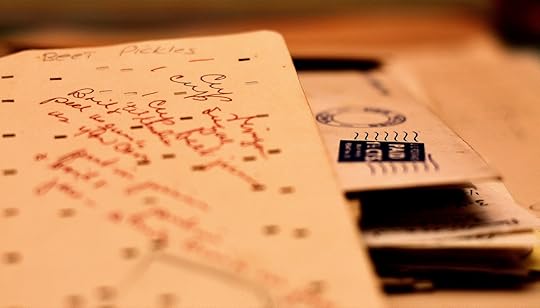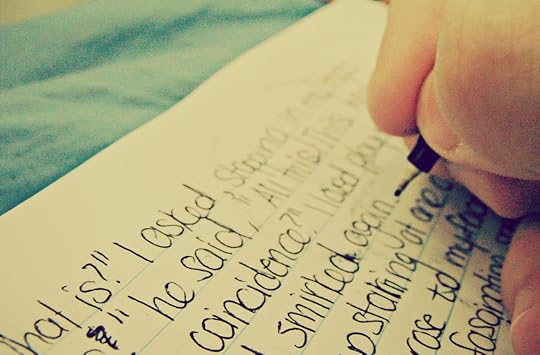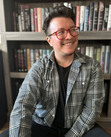Gabe Cole Novoa's Blog, page 59
June 23, 2015
Vlog: On Finding Time to Write
On misconceptions about writers and free time, commitment to writing, and how to find time to write.
RELATED LINKS:
Why Writers Must Read (vlog)Why Writers Must Read (blog post version)Writing When You Don't Want ToHow to Write a Novel in Only 500 Words a DayHow to Juggle Writing and LifeOn Prioritizing Your TimeWriting When You Don't Want To (vlog) What do you think? Have you come across this misconception?
Twitter-sized bites:





RELATED LINKS:
Why Writers Must Read (vlog)Why Writers Must Read (blog post version)Writing When You Don't Want ToHow to Write a Novel in Only 500 Words a DayHow to Juggle Writing and LifeOn Prioritizing Your TimeWriting When You Don't Want To (vlog) What do you think? Have you come across this misconception?
Twitter-sized bites:
"If you don't find the time to write when you're [busy] you won't find the time...when you're not." (Click to tweet)
Writer @Ava_Jae says, "finding the time to write takes sacrifice." What do you think? (Click to tweet)





Published on June 23, 2015 04:00
Fixing the First Page Giveaway Winner #12!
 Photo credit: demandaj on FlickrQuick pre-vlog post today to announce the winner of the twelfth fixing the first page feature giveaway! Are you ready?
Photo credit: demandaj on FlickrQuick pre-vlog post today to announce the winner of the twelfth fixing the first page feature giveaway! Are you ready?The winner is…
FARIDA MESTEK
Yay! Congratulations, Farida! Expect an e-mail from me shortly.
Thank you to all you lovely entrants! If you didn't win, as always, there will be another fixing the first page giveaway next month, so keep an eye out! :)





Published on June 23, 2015 03:19
June 22, 2015
5 Things I Learned While Publishing a Book About Mental Illness by Francesca Zappia
 Photo credit: MineToday I've got a really special post from Francesca Zappia, author of Made You Up which has gotten quite a bit of buzz lately, to say the least (I mean, John Green tweeted about it on her release day. So). Enjoy!
Photo credit: MineToday I've got a really special post from Francesca Zappia, author of Made You Up which has gotten quite a bit of buzz lately, to say the least (I mean, John Green tweeted about it on her release day. So). Enjoy!Unless you are the most experienced person living on the Earth, I think it would be pretty difficult not to learn anything at all while publishing your debut novel. Even harder when your debut novel is about a topic like mental illness—or, in the case of my debut, Made You Up, paranoid schizophrenia. I’ve learned a lot in the last half year, and while I can’t lay it all out in a blog post, I can sum the most important points.
A lot of people have been asking me about the book, what the process has been like, and if I have any advice, so I hope this helps. So here they are: the top five things I learned while publishing Made You Up.
Do your research. I didn’t have to actually learn this one, and I’m sure I don’t have to explain it to you. If you’re writing about a mental illness, you have to do your research. Maybe you have or have had the illness you’re writing about. Maybe one of your family members or friends has/had it. In either of those cases, you’re already ahead of the game, but research is always important.
Go 100%. I wrote a book about a girl with paranoid schizophrenia. There is no way—at least not that I know of in this day and age—to write a book about a main character with a serious mental illness and not have the book be about that mental illness. About the stigmas and fear that come along with it. You don’t put mental illness in a story to give your character an amusing/unusual trait. If you’re going to do it, do it. Talk about it. Make people know you’re writing about it for a reason.
Brace for rejection. This is a thing that happens. It happens with all kinds of diverse books—books about PoC protagonists, disabled protagonists, protagonists of different sexualities. The dreaded “We already have one of those books in our list” rejections. Yes, it happens with mental illnesses, too. Yes, it is still frustrating.
Listen and learn. What I have found so far from Made You Up is that there is no consensus on its actual portrayal of paranoid schizophrenia. I wish I could say everyone loved it and said it was perfect, but there are people on both sides of the fence. Some loved it and thought it was honest and sensitive; others positively hated it. I’ve listened to both sides of this and tried to absorb everything I could. I can’t change anything in Made You Up, but I can learn from this for my future work.
Stay loose [or: Have fun]. Made You Up would not be Made You Up if I hadn’t had fun with the characters and the story. You’re writing about a serious topic, so please give it the respect it deserves, but that doesn’t mean it has to be boring. That doesn’t mean your characters have to behave like lesson-teachers instead of real people. That doesn’t mean the whole book has to be doom and gloom. People with mental illnesses can still laugh; your readers should be allowed to laugh along with them.
 Photo credit: Samantha StanleyFrancesca Zappia lives in Indiana and majors in Computer Science at the University of Indianapolis. She spends most of her time writing, reading, drawing, and playing way too much Pokémon. You can find her on Twitter @ChessieZappia, Tumblr, and on her website.
Photo credit: Samantha StanleyFrancesca Zappia lives in Indiana and majors in Computer Science at the University of Indianapolis. She spends most of her time writing, reading, drawing, and playing way too much Pokémon. You can find her on Twitter @ChessieZappia, Tumblr, and on her website.Twitter-sized bite:
.@ChessieZappia shares 5 things she learned while publishing a book about mental illness. (Click to tweet)





Published on June 22, 2015 04:00
June 19, 2015
How to Worldbuild (Without Info-dumping)
 martinak15 on Flickr
Note: Don't forget you have until 6/22 at midnight EST to enter for a chance to win a first 250 critique featured here on Writability!
martinak15 on Flickr
Note: Don't forget you have until 6/22 at midnight EST to enter for a chance to win a first 250 critique featured here on Writability!
So fun fact: worldbuilding is frequently my biggest struggle, particularly in early drafts. Which is really too bad because I love writing books that require a ton of it, so it’s really no surprise that I tend to get lots of worldbuilding notes from CPs, betas and later readers late in the revision process.
Good news is even though I have to work extra hard to get it right, I actually love worldbuilding. But boy, it can be a major challenge sometimes, especially when it comes to figuring out how to balance building a world without burying readers in a world information avalanche.
So how do you worldbuild without info-dumping? The key, for me at least, is to think of worldbuilding as layered. Some layers may include:
Architecture/physical settingWeatherLanguageClothing/styleFoodNames/locationsHistoryLaws/GovernmentTechnologyTraditionsCultural mannerisms
And so on, but you get the idea.
As I go through my WIP during revision rounds I try to focus on one layer at a time, or a couple related layers at a time. This can be as simple as going through and paying attention to what everyone is wearing and making adjustments as necessary, while ignoring the rest of the story. And doing the same for food. And dropping a tidbit of history here and a mannerism there.
Rome wasn’t built in a day and your world shouldn’t be built all at once. Worldbuilding is a gradual, ongoing process—it’s an offhanded comment about a failed historical ruler, a city named after a victorious battle, a particular style of dress, your MC’s favorite dessert, and whether it’s frigid and snowy or hot and arid.
Secondly, any information you give should be woven in organically and make sense in context. It’s unlikely that in the middle of a war, your MC is going to think about formal menswear (unless everyone is wearing formal menswear to war, which I suppose isn’t out of the question hypothetically speaking), but if your MC goes to a wedding it’d make sense to think about what people are wearing. Similarly, we don’t need a full accounting of your world’s history from inception to present day—instead, it can be really effective to give snippets here and there as they become relevant.
Think of worldbuilding elements as spices. A pinch here and there as you go along to add layers to your world and make it vivid and engaging is what you should be aiming for—but a mountain of salt on your first page is too much too fast.
Have you tried worldbuilding in layers?
Twitter-sized bites:
Writer @Ava_Jae says, "worldbuilding is a gradual, ongoing process." What do you think? (Click to tweet)
How do you worldbuild without burying readers in information? @Ava_Jae says it's all about layers. (Click to tweet)





Published on June 19, 2015 04:00
June 17, 2015
Fixing the First Page Feature Giveaway #12!
 Photo credit: Phil Roeder on FlickrSomehow, we are nearing the end of June! Which means it's time for another giveaway! Woot!
Photo credit: Phil Roeder on FlickrSomehow, we are nearing the end of June! Which means it's time for another giveaway! Woot!For those who’ve missed it in the past, the Fixing the First Page features is a public first 250 word critique. Using the lovely rafflecopter widget, anyone interested in winning a PUBLIC (as in, featured in a post on this blog) first page critique can enter.
For an example of what this critique will look like, here's the last Fixing the First Page post.
Rules!
ONLY the first 250 words will be critiqued (up to finishing the sentence). If you win and send me more, I will crop it myself. No exceptions.
ONLY the first page. I don’t want 250 random words from your manuscript, or from chapter 3. If you win the critique and send me anything other than the first 250 words of your manuscript, I will choose someone else.
I will actually critique it. Here. On the blog. I will say things as nicely as I can, but I do tend to be a little blunt. If you’re not sure you can handle a public critique, then you may want to take some time to think about it before you enter.
Genre restrictions. I'm most experienced with YA & NA, but I will still accept MG and Adult. HOWEVER. If your first page has any erotic content on it, I ask that you don’t enter. I want to be able to post the critique and the first 250 in its entirety without making anyone uncomfortable, and if you win and you enter a page with erotic content, I will choose someone else.
You must have your first page ready. Should you win, you need to be able to submit your first page within 48 hours of my contacting you to let you know you won. If 48 hours pass and I haven’t heard from you, again, I will choose someone else.
You’ll get the most out of this if it isn’t a first draft. Obviously, I have no way of knowing if you’re handing me a first draft (though I will probably suspect because it’s usually not that difficult to tell). I won’t refuse your page if it’s a first draft, but you should know that this critique will likely be of more use if you’ve already had your betas/CPs look over it. Why? Because if you don’t, the critique I give you will probably contain a lot of notes that your betas & CPs could have/would have told you.
There will not be a round 2 (unless you win again in a future contest). I hate to have to say this, but if you win a critique, it’s NOT an invitation to send me a bunch of your revisions. I wish I had the time available to be able to look at revisions, but sadly, I don’t. If you try to break this rule, I will nicely say no, and also remember to choose someone else should you win a second contest. Which would make me sad. :(So that’s it! If you’re okay with all of the above and would like to enter to be the twelfth public critique on Writability, do the thing with the rafflecopter widget below. You have until Monday, June 22 at 11:59 EST to enter!
a Rafflecopter giveaway





Published on June 17, 2015 04:00
June 16, 2015
Vlog: Where to Start Your Book?
Trying to figure out where to start your book can be beyond difficult, so today I'm sharing some tips starting with the inciting incident.
RELATED LINKS:
Elements of a Great Book EndingPlot Essentials: Inciting IncidentBook Beginnings: Where to Start? Simon vs. The Homo Sapiens Agenda by Becky Albertalli The Hunger Games by Suzanne Collins The Fault in Our Stars by John Green How do you decide where to start your novel?
Twitter-sized bites:





RELATED LINKS:
Elements of a Great Book EndingPlot Essentials: Inciting IncidentBook Beginnings: Where to Start? Simon vs. The Homo Sapiens Agenda by Becky Albertalli The Hunger Games by Suzanne Collins The Fault in Our Stars by John Green How do you decide where to start your novel?
Twitter-sized bites:
Not sure where to start your book? @Ava_Jae vlogs some tips for figuring out the right place to open. (Click to tweet)
What is the inciting incident & what does it have to do w/ where you start your book? @Ava_Jae vlogs some answers. (Click to tweet)





Published on June 16, 2015 04:40
June 15, 2015
On Exceptions
 Photo credit: Nellie0224 on FlickrSo I frequently blog and vlog about writing rules. And writing tips and dos and don’ts. And I say things like don’t edit while you’re first drafting and prologues are frequently unnecessary and avoid backstory on your first page.
Photo credit: Nellie0224 on FlickrSo I frequently blog and vlog about writing rules. And writing tips and dos and don’ts. And I say things like don’t edit while you’re first drafting and prologues are frequently unnecessary and avoid backstory on your first page. But here’s the truth with any and all writing tips, dos and don’ts: there are almost always exceptions.
I try to say this from time to time, because for every writing rule, there’s an example of the opposite that worked. For every prologue that could be tossed is a prologue that is friggin’ amazing—for every writer who blazes through their first draft without looking back is a writer who edits while first drafting and finishes with a smile. For every “best not to do this” there is an example of that very thing working beautifully.
The main writing rule I can think of without an exception is writers must read. There are probably (definitely) others. But by and large, most writing rules have exceptions and that’s okay.
The only thing with exceptions is it is much, much harder to pull an exception off successfully. Impossible? Absolutely not. But way more difficult, yeah.
The reason there are rules and tips to begin with is because those rules show methods that make things easier. That generally work, that make the whole writing process more simple if you follow them. They’re mean to be guidelines to help you, rather than laws that must absolutely 100% be adhered to.
For example, many writer types and publishing people will advise you not to start your book with a character waking up. I’ve probably even said this myself. It’s overdone, and often leads to characters dictating every part of their day before the exciting thing happens and yeah, oftentimes it doesn’t work.
But spoiler: Beyond the Red starts with a character waking up. From the first paragraph. And I wrote it knowing full well that characters waking up in an opening are super overdone, so I did my best to try to do it differently. And I don’t know if it’s going to stay that way in the final, published version, but it’s worked so far.
Would it have been easier to start elsewhere? Maybe. But that was where the story started in my mind, and so I went with it. It was an exception, even though I still actively try to avoid writing openings with characters waking up.
Writer types and publishing people will advise you not to write in second person. Not because it’s a horrible POV, but because it’s super, ridiculously tough to pull off well and a lot of readers don’t like it. But guess what? Books like Half Bad by Sally Green start with a second person section and has several chapters in second person. And not everyone will necessarily agree with me, but I thought it worked super well.
I’m not trying to say that I’m special or Sally Green is special—I’m just saying exceptions do happen. And sometimes, learning the writing rules really well means that you know how to bend them and occasionally even break them. And it means that you know how to do it in a way that works. Maybe.
Ultimately, you’re making things harder for yourself when you break writing rules. But if you manage to pull it off, sometimes the result can be really awesome.
So if you ever see a writing rule that just really doesn’t resonate with you, it’s okay. There are exceptions. Maybe this is one of them.
What do you think? Have you come across any good exceptions to a writing rule?
Twitter-sized bites:
Writer @Ava_Jae says there are almost always exceptions to every writing rule. What do you think? (Click to tweet)
Have you come across any good exceptions to a writing rule? Join the discussion on @Ava_Jae's blog. (Click to tweet)





Published on June 15, 2015 04:00
June 12, 2015
Discussion: What Are You Reading?
 Photo credit: Capture Queen on FlickrSo after a crazy day of ten plus hours of revisions on Wednesday, I finished the latest round of revisions on the #YAFantasyWIP. Which means it's time to relax, look for betas, and let my brain rest.
Photo credit: Capture Queen on FlickrSo after a crazy day of ten plus hours of revisions on Wednesday, I finished the latest round of revisions on the #YAFantasyWIP. Which means it's time to relax, look for betas, and let my brain rest.Also, it's time to catch up on my reading.
When I get really heavy into revisions, I generally don't read nearly as much as usual, because by the time I'm done working for the day, my brain is pretty tired of words. So I didn't read much of anything since finishing my research books and diving into revisions, despite having quite a few books I'm dying to get into.
Which brings me to this post.
Right now, I'm about halfway through Second Position by Katherine Locke, which I put down for a bit so I could revise, and now am going to dive back into in earnest. Next up on the list is Made You Up by Francesca Zappia which I've been dying to read forever, then More Happy Than Not by Adam Silvera, which arrived at my door recently and I'm super psyched about.
From there will be Far From You by Tess Sharpe—another book I've heard loads about and am very eager to read—and then All the Rage by Courtney Summers, which I won in a giveaway (eep!).
After that I have plenty more owned TBR books (including, but not limited to, The Infinite Sea by Rick Yancey, Days of Blood and Starlight by Laini Taylor, Crown of Midnight by Sarah J. Maas and Heartsick by Caitlin Sinead) that I'm super psyched to read, and also a pre-order of Focus On Me by Megan Erickson which will magically appear on my Nook on July 21st (and be promptly magically devoured by me).
So yeah. Lots of reading. Lots of books. Lots to look forward to.
And now I'm opening up discussion to you guys— w hat are you reading?
Twitter-sized bite:
What are you currently reading (or looking forward to reading)? Join the discussion on @Ava_Jae's blog. (Click to tweet)





Published on June 12, 2015 04:00
June 10, 2015
How to Beat a Writing Block (Without Writing)
So the other day, while working on revisions, I tweeted this:
When the alternate-universe mind-movie daydreaming doesn’t work, sometimes I find getting away from the computer and doing something else helps. Taking a walk, taking a shower, doing chores I was putting off, etc. often leads to new connections in my mind, and even if those connections don’t solve the block entirely, they frequently get me thinking in the direction that does lead to overcoming the block.
 Photo credit: Aztlek on FlickrBasically, your subconscious sometimes does the work for you, which is pretty darn nice. I’ve had more than a couple epiphany moments both on WIP stuff and blog post stuff away from the computer.
Photo credit: Aztlek on FlickrBasically, your subconscious sometimes does the work for you, which is pretty darn nice. I’ve had more than a couple epiphany moments both on WIP stuff and blog post stuff away from the computer.
Some other suggestions I got from writers on Twitter included talking a scene out (presumably in private) and listening to music. I’ve also found, occasionally, that working on something else entirely sometimes leads to breakthroughs, like my brain wanted me to focus on something else while working its magic (hey, whatever works).
In the end, of course, if none of these passive solutions work, then it might be time to pull out a pad of paper or a new document and work things out step by step. But you never know when not-writing can actually help you write, after all.
What non-writing solutions do you have for beating the block?
Twitter-sized bite:





Sometimes when I get stuck #writing, I stop & visualize how it could go until I'm happy w/ a solution. Like watching a movie in my mind.— Ava Jae (@Ava_Jae) June 7, 2015And to my pleasant surprise, I received a whole load of responses back of people saying they did basically the same thing, or something similar. Which got me thinking about ways to get around a writing block without actually writing.
When the alternate-universe mind-movie daydreaming doesn’t work, sometimes I find getting away from the computer and doing something else helps. Taking a walk, taking a shower, doing chores I was putting off, etc. often leads to new connections in my mind, and even if those connections don’t solve the block entirely, they frequently get me thinking in the direction that does lead to overcoming the block.
 Photo credit: Aztlek on FlickrBasically, your subconscious sometimes does the work for you, which is pretty darn nice. I’ve had more than a couple epiphany moments both on WIP stuff and blog post stuff away from the computer.
Photo credit: Aztlek on FlickrBasically, your subconscious sometimes does the work for you, which is pretty darn nice. I’ve had more than a couple epiphany moments both on WIP stuff and blog post stuff away from the computer.Some other suggestions I got from writers on Twitter included talking a scene out (presumably in private) and listening to music. I’ve also found, occasionally, that working on something else entirely sometimes leads to breakthroughs, like my brain wanted me to focus on something else while working its magic (hey, whatever works).
In the end, of course, if none of these passive solutions work, then it might be time to pull out a pad of paper or a new document and work things out step by step. But you never know when not-writing can actually help you write, after all.
What non-writing solutions do you have for beating the block?
Twitter-sized bite:
How can you beat a writing block without writing? Writer @Ava_Jae shares some ideas. (Click to tweet)





Published on June 10, 2015 04:00
June 9, 2015
Vlog: Young Adult vs. New Adult
Categories can be confusing, so today I'm talking about the difference between two I see confused the most: Young Adult and New Adult.
RELATED LINKS:
Genre vs. Category (vlog)What Genre is Your WIP? (vlog)Young Adult vs. New Adult: What's the Difference? (blog post version)YA: It's Not a Genre How to Determine Your WIP's GenreFangirl by Rainbow RowellFinding It by Cora Carmack
What other differences have you noticed between YA and NA? Any exceptions to the rule?
Twitter-sized bites:





RELATED LINKS:
Genre vs. Category (vlog)What Genre is Your WIP? (vlog)Young Adult vs. New Adult: What's the Difference? (blog post version)YA: It's Not a Genre How to Determine Your WIP's GenreFangirl by Rainbow RowellFinding It by Cora Carmack
What other differences have you noticed between YA and NA? Any exceptions to the rule?
Twitter-sized bites:
Confused about the difference between YA & NA? Writer @Ava_Jae vlogs about why they're not the same. (Click to tweet)
What's the difference between YA & NA books? @Ava_Jae breaks it down in today's vlog. #booktube (Click to tweet)





Published on June 09, 2015 04:07



